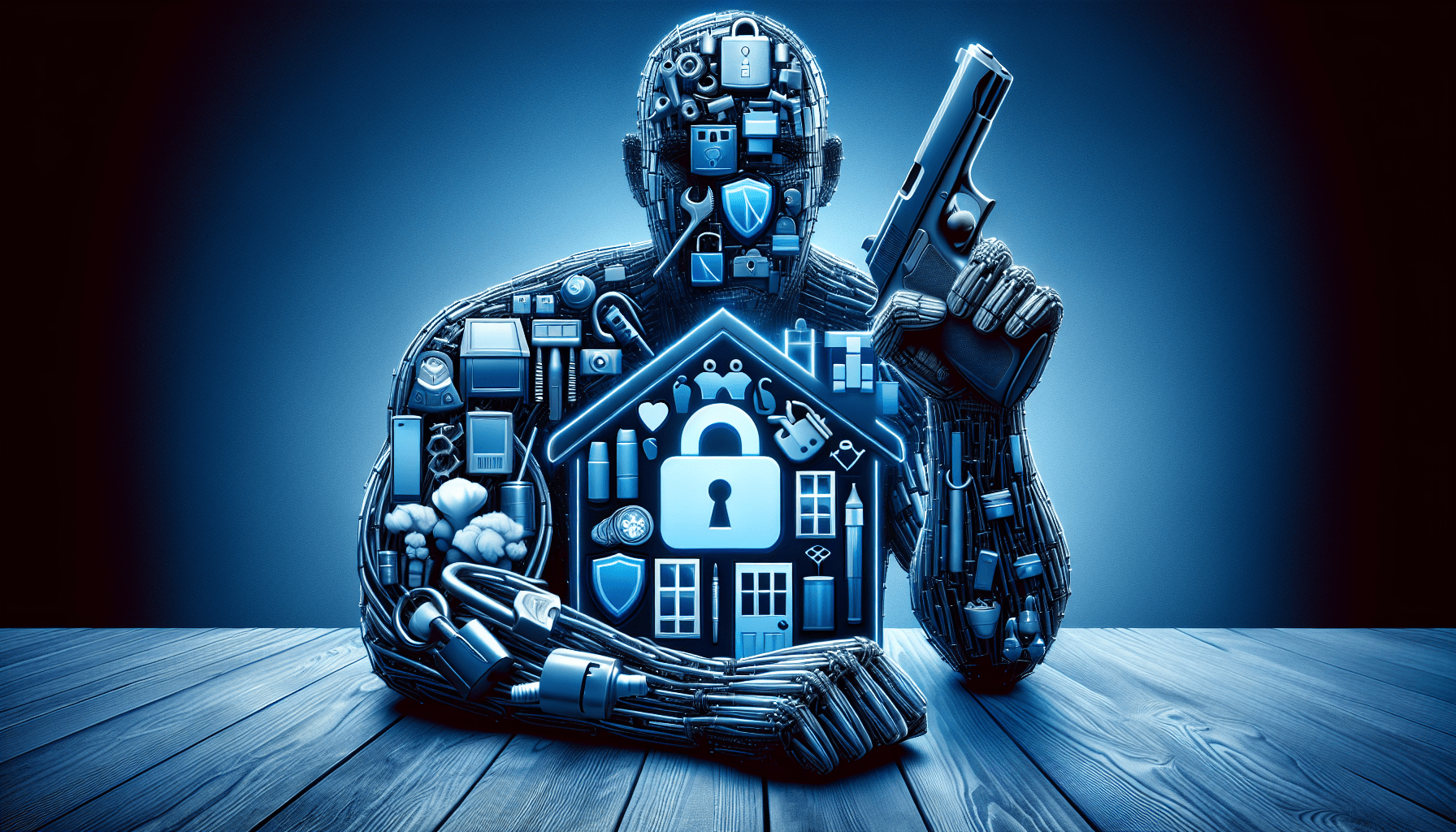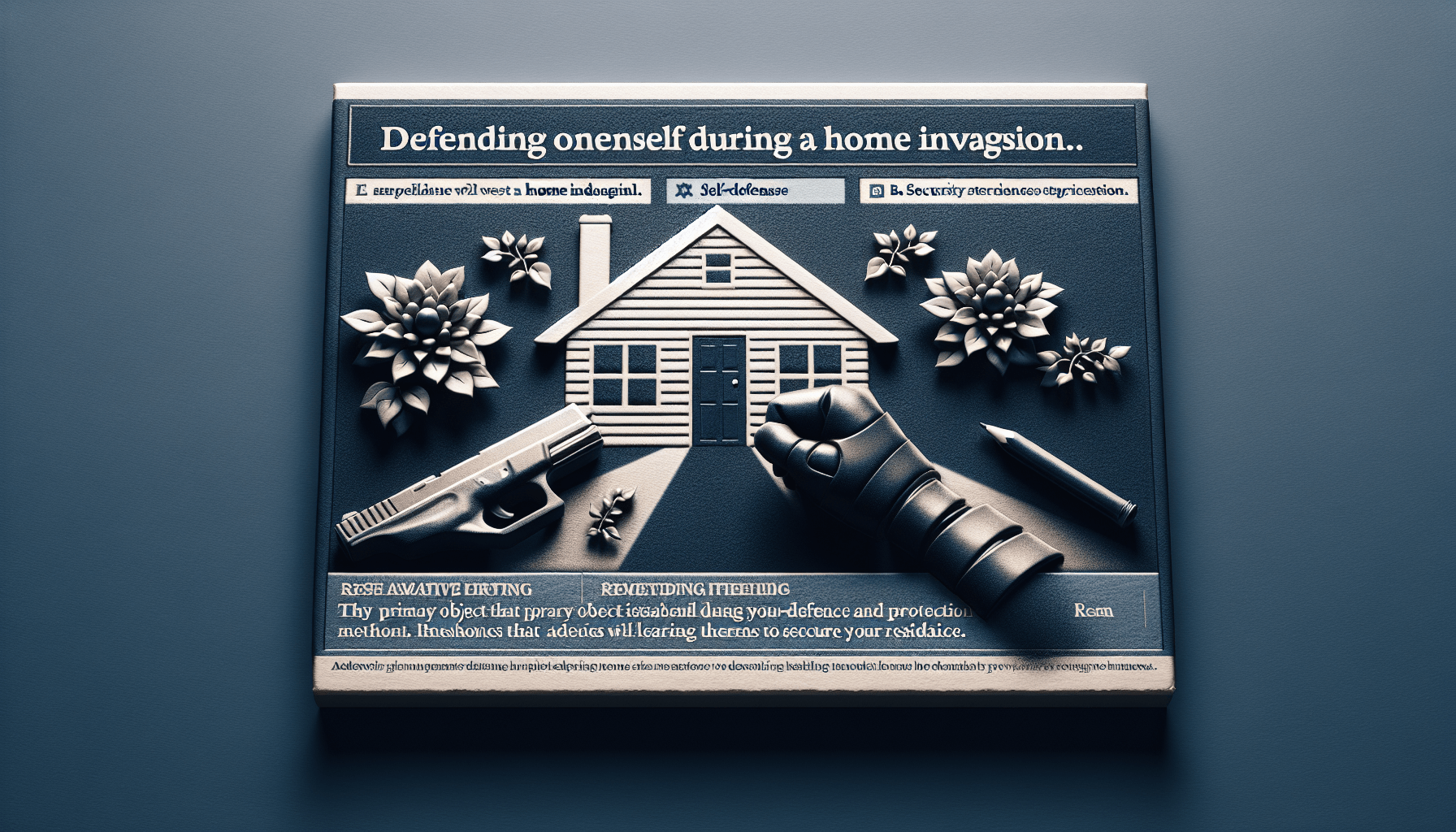Imagine this scenario: you’re peacefully sitting at home, enjoying a quiet evening, when suddenly you hear the shattering of glass and the loud thud of intruders breaking into your house. It’s a terrifying thought, but unfortunately, home invasions can happen to anyone. In this article, you will learn some invaluable tips on how to defend yourself in a home invasion. By understanding these self-defense strategies, you can feel more confident and prepared to protect yourself and your loved ones, should the unthinkable become a reality.

Securing Your Home
Install sturdy doors and locks
Ensuring the security of your home starts with the installation of sturdy doors and locks. Opt for solid doors made from materials such as solid wood or metal that are difficult to break through. Additionally, invest in high-quality deadbolts and secure locks for added protection. By fortifying your entry points, you are creating a strong first line of defense against potential intruders.
Install security cameras
Security cameras are an excellent deterrent for potential intruders. Install them in strategic locations around the exterior of your home to monitor the surroundings. A visible security camera system can deter criminals, as they are less likely to target a property that is monitored. Moreover, these cameras provide valuable evidence in the event of a break-in, which can aid the authorities in their investigation.
Secure windows with bars
Windows are often seen as vulnerable points of entry for burglars. To further enhance the security of your home, consider installing sturdy bars or grilles on your windows. These physical barriers act as a deterrent and make it more difficult for intruders to gain access. Additionally, reinforcing your windows with laminated glass or window film can help prevent breakage.
Use motion-sensor lights
Motion-sensor lights are an effective way to deter potential intruders during the night. By installing these lights around your property, any movement within the sensor’s range will trigger the lights to turn on, illuminating the area. This sudden burst of light can startle intruders and draw attention to their presence. Motion-sensor lights offer an additional layer of security, making it harder for anyone to approach your home undetected.
Creating a Safe Room
Identify a room with minimal windows
To create a safe room within your home, it is crucial to identify a suitable room with minimal windows. Ideally, choose a room on the upper floor of your house, as it is typically harder for intruders to access. The goal is to find a space that can be easily secured and allows for limited visibility from the outside, ensuring your safety and privacy.
Reinforce the door
The door to your safe room should be reinforced to withstand any attempts to force entry. Consider replacing the existing door with a solid core door or reinforcing it with metal bars or a security door brace. Strengthening the door and its frame will make it much harder for intruders to break through.
Stock the room with essential supplies
It is essential to stock your safe room with essential supplies to ensure your comfort and survival in case of an emergency or prolonged siege. Items such as non-perishable food, water, a first aid kit, a flashlight, essential medications, and blankets should be readily available. Make sure to regularly check and update these supplies to ensure their effectiveness when the need arises.
Install a communication device
In your safe room, install a reliable communication device, such as a cell phone or a two-way radio, to stay in contact with emergency services or family members outside the room. Keep the device’s battery charged and ensure it has a strong signal. This will enable you to call for help and relay crucial information about the situation to the authorities.

Being Prepared
Familiarize yourself with self-defense techniques
Taking the time to familiarize yourself with basic self-defense techniques can greatly increase your confidence and ability to protect yourself and your loved ones. Learn techniques such as proper body positioning, striking vulnerable areas, and escaping from holds. Self-defense classes or online tutorials can provide valuable guidance on these techniques and help you develop the necessary skills.
Consider taking a self-defense course
If you want to further enhance your self-defense skills, consider enrolling in a self-defense course. These courses are taught by professionals who can teach you advanced techniques and provide realistic training scenarios. Participating in a self-defense course not only equips you with physical skills but also helps build your confidence and mental preparedness.
Stay alert and aware of your surroundings
One of the simplest and most effective ways to protect yourself is to maintain a high level of situational awareness. Always be mindful of your surroundings, both inside and outside your home. Avoid distractions such as excessive cellphone use when walking alone or returning home. By being alert and aware, you can potentially detect potential threats or suspicious activities early on and take appropriate action.
Defensive Weapons
Keep a baseball bat or golf club easily accessible
Having a readily accessible defensive weapon, such as a baseball bat or golf club, can provide a sense of security and act as a deterrent. Keep it strategically placed near your bed or in a location that is easily reachable in case of an emergency. While these weapons may not have the same effectiveness as a firearm, they can still serve as a means to protect yourself in certain situations.
Consider owning a firearm
Owning a firearm is a personal choice and comes with great responsibility. If you feel comfortable, knowledgeable, and willing to take on this responsibility, consider obtaining a firearm for self-defense purposes. However, it is crucial to undergo proper training and education on firearm safety. Additionally, follow all legal requirements and obtain the necessary licenses and permits required in your jurisdiction.
Obtain proper training and licensing for firearms
If you decide to own a firearm, it is imperative that you receive proper training on its safe and responsible use. Enroll in a certified firearms training program to learn essential skills such as proper handling, marksmanship, and understanding legal implications. Obtaining the necessary licensing and permits demonstrates your commitment to responsible gun ownership and ensures you remain within the boundaries of the law.

Developing a Plan
Create a family emergency plan
Establishing a family emergency plan is crucial to ensure everyone knows what to do in the event of a home invasion or other emergencies. Sit down with your family members and discuss various scenarios, including evacuation routes, communication methods, and designated safe meeting places. Assign specific roles and responsibilities to each family member to ensure a coordinated and efficient response.
Establish safe meeting places for family members
Identify safe meeting places both inside and outside your home in case family members become separated during a home invasion or emergency situation. These predefined meeting places can help ensure everyone gathers in a secure location and facilitate communication. Choose easily recognizable locations, such as a neighbor’s house or a nearby park, and make sure everyone knows how to find them.
Practice emergency drills
Regularly practicing emergency drills ensures that everyone in your household knows what to do and how to react when faced with a home invasion or emergency situation. Conduct practice drills to familiarize yourselves with evacuation routes, safe room procedures, and communication methods. Simulating various scenarios can help reduce panic and increase the effectiveness of your response in real-life situations.
Reacting to an Intruder
Stay calm and assess the situation
In the event of a home invasion, it is essential to remain calm and think clearly. Panicking or acting impulsively can lead to poor decision-making and compromise your safety. Take a moment to assess the situation and evaluate the threat level. This will allow you to respond appropriately and provide accurate information when contacting emergency services.
Avoid confrontation if possible
Your priority should always be the safety and well-being of yourself and your loved ones. If you encounter an intruder, avoid confrontation if possible. Attempting to engage an intruder physically can increase the risk to yourself. Instead, focus on securing your safety and the safety of others by following your predetermined plan and seeking immediate assistance from the authorities.
Call emergency services immediately
Contacting emergency services should be your first course of action during a home invasion. Dial the emergency number, typically 911, and provide clear and concise information about the situation. Stay on the line with the dispatcher and follow their instructions. Remain calm and provide as much detail as possible, including the number of intruders, their description, and any additional relevant information that can aid the responding authorities.

Protecting Yourself and Loved Ones
Raise the alarm to alert other household members
If you find yourself in a home invasion situation, it is crucial to raise the alarm and alert other household members. Use a pre-determined code word or phrase that indicates danger without overtly disclosing your location to potential intruders. This will ensure that everyone is aware of the situation and can take appropriate action to protect themselves and seek safety.
Evacuate if it’s safe to do so
If circumstances permit, evacuating the premises should be considered. If you can safely leave your home, do so immediately and seek refuge in a nearby secure location, such as a neighbor’s house or a designated safe meeting place. Remember to follow your family emergency plan and prioritize the safety of yourself and your loved ones.
Use self-defense techniques if necessary
In situations where escape is not possible or as a last resort for self-defense, utilize the self-defense techniques and skills you have learned. Focus on striking vulnerable areas, such as the eyes or groin, to disable your attacker and create an opportunity to escape. Remember, self-defense should always be a last resort, and using force should only be done to protect yourself or others from imminent harm.
Communicating with Authorities
Provide clear and concise information when calling 911
When contacting emergency services, it is crucial to provide clear and concise information regarding the home invasion. Remain calm while speaking to the emergency dispatcher and provide factual details about the situation, including your name, address, and a description of the intruders. Any additional information, such as their actions or any weapons they possess, should also be communicated to aid the responding authorities.
Follow instructions given by the emergency dispatcher
During the call with emergency services, listen carefully to the instructions given by the emergency dispatcher. They are trained professionals who can provide guidance based on the situation at hand. It is important to follow their instructions and relay any updates or changes in the circumstances promptly. Their guidance can help ensure your safety and the effectiveness of the response from law enforcement.

Legal Considerations
Understand self-defense laws in your jurisdiction
Understanding the self-defense laws in your jurisdiction is crucial to ensure you act within the boundaries of the law. Different regions may have varying guidelines regarding the use of force in self-defense. Familiarize yourself with these laws and seek legal advice if necessary. By doing so, you can make informed decisions and be aware of the potential legal implications in cases of self-defense.
Be aware of the legal implications of using force
Using force in self-defense should be approached with caution, as there may be legal implications depending on the circumstances. While protecting yourself and your loved ones is paramount, it is essential to be aware of the legal consequences that may arise from your actions. Consult local law enforcement or legal professionals for guidance on the boundaries and legality surrounding self-defense incidents in your jurisdiction.
Seeking Support
Report the incident to the police
After a home invasion, it is crucial to report the incident to the police as soon as possible. Contact your local law enforcement agency and provide them with accurate details of the event. This not only aids in the investigation but also contributes to the overall safety of your community. Providing the police with any information you have about the intruders can potentially help prevent future crimes.
Seek counseling or support groups to cope with the emotional aftermath
Experiencing a home invasion can have long-lasting emotional effects on you and your loved ones. It is essential to seek support to help cope with the aftermath of such a traumatic event. Consider reaching out to a licensed therapist or counselor who specializes in trauma to help process and manage the emotional impact. Additionally, support groups comprised of individuals who have experienced similar situations can offer understanding and guidance during your recovery process. Remember, seeking support is a sign of strength and resilience.
